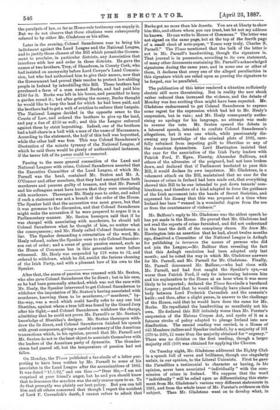Mr. Balfour's reply to Mr. Gladstone was the ablest speech
he has yet made in the House. He proved that Mr. Gladstone had not read the reports of crime furnished, and did not understand in the least the drift of the conspiracy clause. He drew Mr. Harrington into an assertion that be had, about twelve months ago, dissolved a Committee of the National League in .Ardagh for publishing in terrorem the names of persons who did not join the League,—Mr. Balfour then revealing the fact that this Ardagh resolution had been adopted only last month ; and he noted the way in which Mr. Gladstone answers for Mr. Parnell, and Mr. Parnell for Mr. Gladstone. Finally, Mr. Parnell denounced Mr. Balfour,—who had risen with Mr. Parnell, and had first caught the Speaker's eye,—as worse than Patrick Ford, if only for intervening between him and his explanation to the House at an hour when it was more likely to be reported ; declared the Times fac.simile a barefaced forgery ; protested that he would willingly have placed his own body between Lord Frederick Cavendish and the assassin's knife ; and then, after a slight pause, in answer to the challenge of the House, said that he would have done the same for Mr. Burke. He repudiated the handwriting as manifestly not his own. He declared this Bill infinitely worse than Mr. Forster's suspension of the Habeas Corpus Act, and spoke of it as a fatuous stroke of policy adapted to plunge Ireland into new disaffection. The second reading was carried, in a House of 645 Members (tellers and Speaker included), by a majority of 101 (370 to 269), 12 more than the majority obtained for "urgency." There was no division on the first reading, though a larger majority still (109) was obtained for applying the Closure.


































 Previous page
Previous page